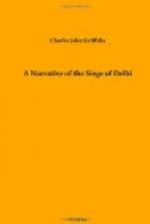Shortly after he left, the field-officer on duty appeared, who ordered me, in case I should be attacked, to defend my post to the last extremity, and in no case to fall back, adding that to my picket, and to those on my right and left, the safety of the camp during the expected sortie, together with the security of our left flank, was entrusted.
After darkness set in the enemy commenced a furious cannonade in the direction of the three pickets, round shot whistling through the trees and shells bursting around us. The din and roar were deafening, but firing, as they did, at random, little damage was done. Nothing can be grander than the sight of live shells cleaving the air on a dark night. They seemed like so many brilliant meteors rushing through the heavens, or like lightning-flashes during a storm, and this being my first experience of the sort, no words can paint my awe and admiration.
We naturally expected an attack in force from the insurgents under cover of the cannonade; but hours passed by in suspense and anxiety, and none was attempted. The firing was continued all night—sleep being impossible—and ceased only at daybreak, when the relief arrived, and I marched the picket back to our camp.
July 3.—That day the monsoon—the Indian wet season—set in, and rain descended in sheets of water for many hours.
In the afternoon it was reported that a large force of mutineers was moving out of the city by the Kabul and Ajmir Gates into the suburbs to the right front of our position, and the alarm sounded, most of the troops in camp turning out and assembling on the road to the rear of the canal. Here we were halted for some time, it being uncertain what direction had been taken by the enemy.
At sunset two doolies, escorted by men of the 5th Punjab Cavalry, were seen on the road coming towards us. They contained the bodies of a European sergeant and a man of the Road Department, who had been surprised and cut to pieces by some of the rebel cavalry. The escort also reported that a body of insurgents numbering many thousand men had been seen moving towards Alipore, one march in our rear, their object, it was supposed, being to cut off supplies and intercept treasure.
It being too late to start in pursuit of the enemy, we were dismissed to our quarters, being warned to hold ourselves in readiness to turn out at a moment’s notice.
July 4.—That night the sound of the enemy’s guns to our rear was heard in the camp, and soon after 2 a. m. we paraded, and joined a force destined to overtake or cut off the mutineers on their return to Delhi. The little army, consisting of 1,500 men, cavalry, artillery, and infantry, marched at once towards Alipore. After we had proceeded three miles, and just at daybreak, news was brought that the enemy, after plundering the town, were retreating to the city laden with booty.
Major Coke, who was in command, then changed our direction to the left, and we advanced for about two miles over swampy ground to a canal, the cavalry being in front, then the infantry, the battery of Horse Artillery bringing up the rear.




